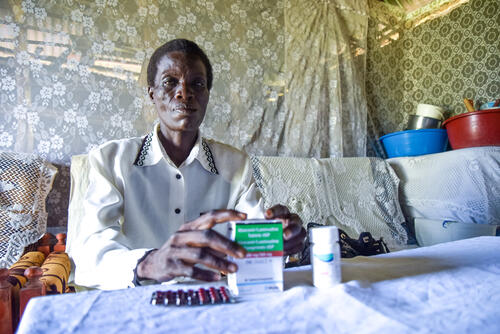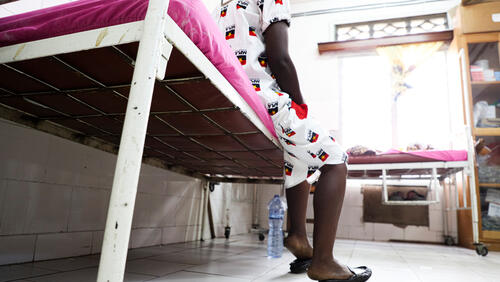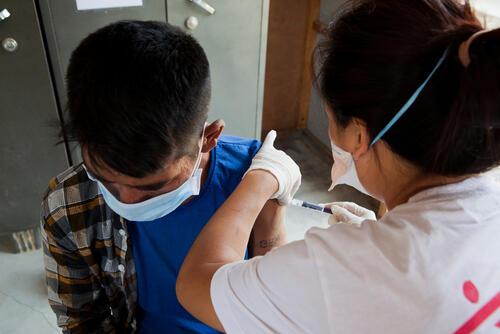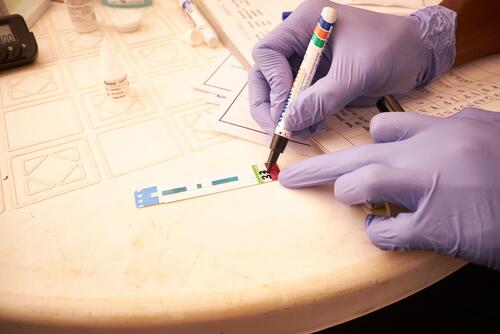Can we do what needs to be done to stop people dying from HIV/AIDS? Maybe – but only if we pay more attention to the people who are most at risk of dying. World leaders will discuss the next steps in the fight against the disease at the UN High Level Meeting on HIV/AIDS on 8-10 June 2021. The political declaration they’re expected to adopt must contain clear and tangible commitments to tackle HIV-related mortality, and include a specific focus on early detection and treatment of the main killer diseases linked to Advanced HIV Disease (AHD or AIDS).
The 2021-2026 UNAIDS strategy aims to reduce the number of people dying from HIV/AIDS to 250,000 by 2025, while also rightly placing emphasis on prevention, rights, and social and political determinants of health. Still, nearly 700,000 HIV-related deaths occurred in 2019, despite being in an era of “test and start”, with free antiretroviral treatment.
While there has been a 39 per cent reduction of AIDS-related deaths since 2010, progress has stalled in recent years, highlighting that scale up of testing and antiretroviral treatment alone is not sufficient to end HIV-related deaths. To address this mortality, we need to focus on finding the most at-risk people living with HIV, make sure they have effective access to antiretroviral treatment, and treat their opportunistic infections. Besides tuberculosis, severe fungal and bacterial infections (such as cryptococcal meningitis), remain the primary comorbidities and are also the primary causes of hospitalisation and death among people living with HIV.
A decade ago, AHD was seen mostly among patients who were unaware of their HIV status, often because of a lack of HIV testing and antiretroviral treatment availability. Today, however, in some Médecins Sans Frontières (MSF) inpatient facilities, 75 per cent of hospital admissions for advanced HIV are patients who are receiving antiretroviral drugs, often for many years. This suggests that they may have interrupted their treatment and/or developed a resistant form of the virus. Unfortunately, this is not detected and treated early enough for most.
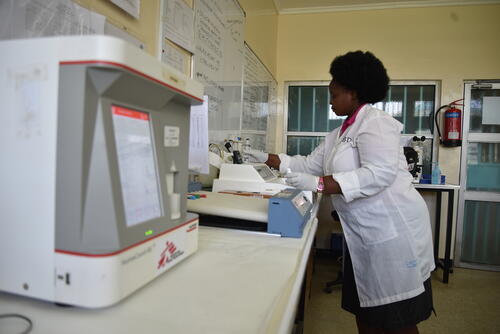
MSF has learnt that the HIV care cascade is not a linear process from testing, early initiation, consistent drug adherence and viral suppression, but a circular one, with many people needing help to re-engage into care after treatment interruption and/or failure. Studies have shown that nearly 25 per cent of patients will interrupt their treatment at some point and that up to one-third of patients starting or restarting antiretroviral treatment have AHD. What follows is immune suppression, opportunistic diseases, hospitalisation and death. In MSF-supported hospitals in Guinea, Democratic Republic of Congo, Kenya and Malawi, we witness a 30-40 per cent mortality rate among patients with AHD.
Since the COVID-19 crisis has caused a reduction in initiations of antiretroviral treatment and in retention in care, the situation is expected to worsen and the number of people living with HIV facing tuberculosis, severe bacterial and fungal infections to rise. The deterioration of patients’ condition brings back the typical complications, putting their life at immediate risk. As antiretroviral treatment no longer suppresses the virus, it goes rampant through their body, allowing opportunistic infections to flare up and once more transmit HIV to their partner or their baby.
Certain countries in West and Central Africa are especially hard hit in terms of mortality. One-fifth of all AIDS-related deaths, and for children, four out of every 10 deaths, in the world occur in this region. We should reach out to people living with HIV at risk with immediate and intensified action for early detection and treatment.
The UN High Level Meeting is a unique opportunity to ensure country commitments on these needs and it should reflect and be built on this. Addressing AHD is key, and it is possible, but there are still important hurdles. Screening for AHD is possible using simple point of carePoint of care is defined as medical diagnostic testing at or near the point of care—that is, at the time and place of patient care. technologies. This accelerates detection and treatment of the deadly infections linked to AIDS and can therefore help to save lives. In Malawi for instance, combining point of care screening by lay cadres in health centres and a rapid assessment unit in hospital, allowed a significant gain of time in diagnosis and starting treatment, leading to reduced mortality among hospitalised patients. Many national guidelines do not yet include targeted AHD services. Availability and affordability of the medicines required to implement them is a key challenge in many countries, particularly in sub-Saharan Africa. Unfavourable markets with high pricing for certain commodities contributed to countries’ slow progress in adoption of an AHD package of care.
There is an urgent need for a global commitment to accelerate the implementation of a package of care to prevent, detect and treat advanced disease. This must include early voluntary and confidential testing; early treatment initiation; increased enabling measures for continuity and retention; and services that reach out and welcome people back in care, which will consequently prevent treatment failure and mortality, and improve early detection of advanced HIV disease.
Only by recognising the importance of AHD, the expected UN High Level Meeting declaration will allow us to curb HIV-related mortality, contributing to removing these obstacles and throwing a lifeline to people with advanced HIV disease.
Dr Gilles van Cutsem is the leader of the MSF HIV/AIDS working group.
Amanda Banda is an MSF HIV advocacy consultant.



